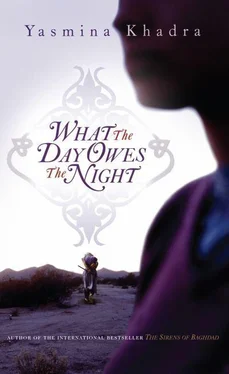‘What happened my mother?’
‘I’ve no idea. I do know that she survived the fire; I saw her with your little sister the next day on the corner of the street. They weren’t injured.’
‘What about Bliss?’
‘He disappeared.’
‘What about the other tenants? Maybe they know something . . .’
‘I don’t know where they went, sorry.’
I made my way back to the Boulevard des Chasseurs with a heavy heart. My friends pestered me to know where I’d been, but their questions simply infuriated me and I went out again and wandered the streets for hours. Again and again I found myself standing in the middle of a street, my head in my hands, trying to compose myself. My mother and my sister were safe, I told myself, and probably better off now than they had been. Batoul the psychic was never wrong – after all, she had predicted Hadda’s fate. My father would come back – it was written on the ripples of the water. My mother would not have to worry any more.
This was what I was thinking when suddenly I saw him . . .
My father!
I was sure it was him – I could have recognised his shadow in the darkness among ten thousand, among a hundred thousand men. It was my father. He had come back. Bent beneath the weight of a thick green coat he was wearing in spite of the heat, he was crossing a crowded square in the Village Nègre. I rushed to catch up with him, pushing through the crowded square, but it seemed that for every step forward, I was pushed two steps back. Not for a moment did I take my eyes off the figure of my father as he shambled away, limping slightly, bowed beneath the weight of his green jacket. I was terrified that if I lost sight of him, I might never find him again. But by the time I finally struggled free of the crowd and made it to the far side of the square, he had vanished.
I looked for him in the local cafés, in the bars, in the hammams . . . but he was gone.
I never saw my mother or my sister again. I do not know what became of them, whether they are alive still or dust mingled with the dust of ages. My father I saw several times. About once every ten years I would spot him in a crowded souk or on a building site; sometimes standing alone on his own, or in the doorway of an abandoned warehouse. I never managed to speak to him. Once, I followed him into a blind alley, certain that at last I had tracked him down, and was shocked to discover that the alley was deserted, there was no one waiting at the foot of the crumbling wall. Only when I realised that he always wore the same green jacket, which seemed to be untouched by time and weather, did I finally understand that the man I saw was not flesh and blood.
Even now, in my declining years, I still see him in the distance sometimes, bowed beneath the weight of his old green jacket, limping slowly towards his doom.
THE SEA looked smooth enough to walk on; not a wave lapped at the beach, not a ripple disturbed the glassy surface. It was a weekday and the beach belonged to us. Next to me, Fabrice lay on his back dozing, a book open over his face. Jean-Christophe was strutting along the water’s edge, showing off as always. The Sosa cousins, André and José, had set up a tent and a barbecue a hundred metres away and were waiting for the girls from Lourmel. Here and there a few families lay sunning themselves along the shore. Were it not for Simon’s antics, we might have been on a desert island.
The sun poured down like molten lead, and seagulls darted across the flawless sky, drunk on space and freedom. From time to time they skimmed the waves, like planes chasing each other and hedge-hopping, only to soar again to melt into the blue. In the distance, a trawler heading for port trailed a cloud of birds in its wake; it had been a good day’s fishing.
The weather was beautiful.
Sitting beneath a parasol, a woman gazed out at the horizon. She wore a broad-brimmed hat with a red ribbon, dark glasses and a white swimsuit that clung to her tanned body like a second skin.
And there would be no more to tell had it not been for a gust of wind.
Had I known that a gust of wind can change the course of a life, I might have been more wary, but at the age of seventeen, we all believe we are invulnerable . . .
The midday breeze had come up and the fateful gust of wind, waiting in ambush, raced along the beach stirring up eddies of sand, whipping the parasol into the air as the lady clutched her hat to stop it from flying away. The parasol pirouetted through the air, sailed along the sand, turned somersaults. Jean-Christophe tried but failed to catch it. If he had, my life would have gone on as before, but fate decreed otherwise. The parasol landed at my feet. I simply reached out and picked it up.
Smiling, the lady watched me as I made my way towards her with the parasol tucked under one arm. She got to her feet.
‘Thank you,’ she said.
‘Don’t mention it, madame.’
I knelt down beside her and began scooping out sand, making the hole where the parasol had been deeper and wider. Then I replanted the parasol, and trampled the sand to make sure it did not fly off again.
‘You are very kind, Monsieur Jonas,’ she said. ‘I’m sorry . . .’ she added quickly. ‘I heard your friends call you that.’
She took off her dark glasses.
‘Are you from Terga?’
‘From Río Salado, madame.’
Her piercing eyes unsettled me. In the distance I could see my friends giggling and laughing at me. I quickly took my leave of the woman and went back to join them.
‘You’re red as a beetroot,’ Jean-Christophe teased me.
‘Leave me alone,’ I said.
Simon, who had just come back from a swim, was rubbing himself vigorously with a towel, a mischievous smile on his lips. He dropped into my chair and said:
‘So what did Madame Cazenave want with you?’
‘You know her?’
‘Of course I know her. Her husband was governor of a penal colony in Guyana. They say he disappeared in the jungle tracking a couple of escaped prisoners. When he didn’t show up, she decided to come home. She’s a good friend of my aunt. My aunt says she thinks Madame Cazenave’s husband succumbed to the charms of some big-bottomed Amazonian beauty and ran off with her.’
‘I’m glad your aunt’s no friend of mine!’
Simon burst out laughing and threw the towel at my face, beat his chest like a gorilla and, with a shrill war cry, raced back down to the sea.
‘Completely mad,’ sighed Fabrice, propping himself up on one elbow to watch Simon perform some ridiculous dive.
The girls André had been waiting for arrived on the stroke of ten. The youngest was at least four or five years older than André and José. The girls kissed the Sosa cousins on both cheeks and settled themselves in canvas chairs. André’s manservant, Jelloul, busied himself at the barbecue, fanning the coals and sending clouds of white smoke across the surrounding dunes. José pulled a hamper from under the piles of bags around the centre pole of the tent, took out a couple of strings of spicy merguez sausages and laid them on the grill. The smell of burning fat began to drift along the beach.
I don’t remember why I decided to head over to André’s tent. Perhaps I was deliberately trying to attract the attention of Madame Cazenave so that I could get another glimpse of her magnificent eyes. If so, she was reading my mind, because as I passed her, she took off her sunglasses, and as she did, I suddenly felt as though I was wading through quicksand.
I saw her again some days later on the main street in Río Salado. She was coming out of a shop, a white hat perched like a crown over her perfect face. People turned to look at her but she did not even notice. She had an aristocratic bearing and did not walk but strode along the avenue to the rhythm of time itself. She reminded me of the enigmatic heroines of the silver screen, who seemed so real that next to them our reality paled into insignificance.
Читать дальше












